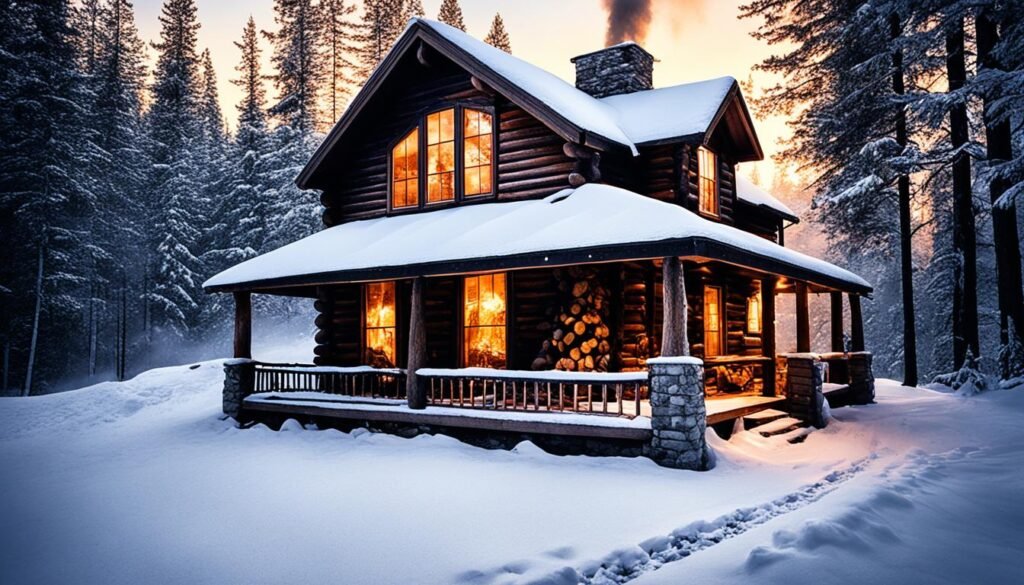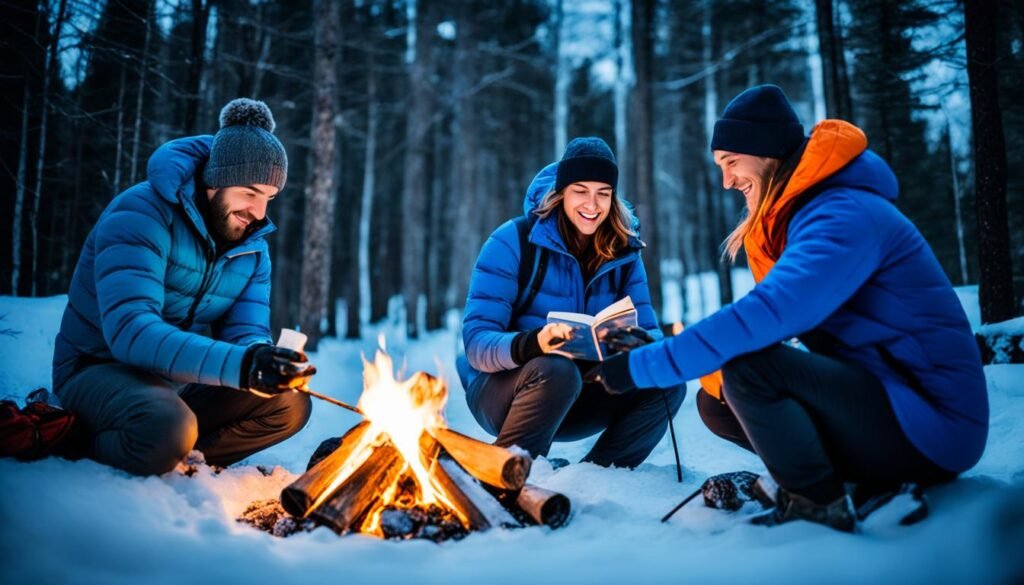Ready for winter van camping? Going into the cold outdoors can be fun! But, you need to plan well to keep warm.
In this guide, I’ll share tips for enjoying winter camping in a van. We’ll talk about how to stay warm and keep dry. Let’s dive into keeping snug and relishing the snowy views.
Key Takeaways:
- Prepare for your winter van camping trip by choosing the right heating options.
- Consider diesel and gasoline air heaters, hydronic heating systems, or propane heaters.
- Understand the advantages and considerations of each heating option before making a decision.
- Prioritize insulation to create a warm and well-insulated living space in your van.
- Choose the sleeping option that best suits your preferences and comfort level.
Heating Options for Winter Van Camping
There are many ways to keep your van warm in winter. You can choose from diesel and gasoline air heaters, hydronic heating systems, and propane heaters. Each has its own benefits and things to think about, like how hard they are to install, what fuel they use, and how well they control the temperature. Knowing about these options will help you pick the best way to heat your van.
Diesel and Gasoline Air Heaters
Diesel and gasoline air heaters are great for keeping your van warm. They work by using fuel to light a small flame which then heats air and pushes it into your van. They’re pretty easy to put in, don’t keep moisture, and are good for many van owners. But, they can’t be used very high up, only heat a small area at a time, and don’t let you adjust the temperature much.
Hydronic Heating Systems
Hydronic systems heat your van using a coolant loop. This can warm the air, water, and even the floors. They give more heat, instant hot water, work well at high altitudes, and let you control the temperature. But, they cost more and are harder to install. If you want more comfort and to save energy while camping in winter, consider these systems.
Propane Heaters
If your van already uses propane, you might like propane heaters. You can find emergency ones or Propex heaters. The emergency types are okay for a short time but need you to let fresh air in and can make your van damp. Propex heaters burn propane cleanly but might not get as warm as others. Think about what your van needs and your propane setup before choosing one.
Whether you go for diesel and gasoline air heaters, hydronic systems, or propane heaters, choosing the right heating solution is key. Below is a table comparing these heating options:
| Heating Option | Advantages | Considerations |
|---|---|---|
| Diesel and Gasoline Air Heaters | Easy installation, dry heat, suitable for most van lifers | Limited altitude ratings, isolated hot air output, less temperature control |
| Hydronic Heating Systems | More heat output, on-demand hot water, higher altitude capabilities, controllable thermostat functions | Higher cost, complex installation, understanding of coolant loops required |
| Propane Heaters | Compatibility with existing propane systems, option for emergency or cleaner burn | Proper ventilation required for emergency heaters, lower heat output for Propex heaters |
Look at the benefits and things to consider for each heating option. This way, you can choose well and keep your van warm and cozy in winter.
Diesel and Gasoline Air Heaters for Winter Camping
Diesel and gasoline air heaters are top choices for heating in winter van camping. They use a simple way to warm up and make your van cozy.
These heaters send fuel to light a glow plug. This lights a small flame inside a chamber. The air gets warm and is pushed into your van, making it cozy.
Installing these heaters is easy, which is great for van lifers. They also vent outside, keeping exhaust or fumes out.
They also give off dry heat. This means less moisture and condensation inside your van. So, your space stays dry and comfy.
“Diesel and gasoline air heaters are a reliable heating option for winter van camping. They are easy to install, vented outside, and provide dry heat, ensuring a cozy living space.”
But, these heaters have some limits. They might not work well at high places. The warm air may not reach everywhere in your van. Also, controlling the temperature precisely can be hard.
Overall, diesel and gasoline air heaters are a good choice for winter camping. They’re easy to put in and help keep your van dry. Just remember their limits like working at high places or uneven heating.
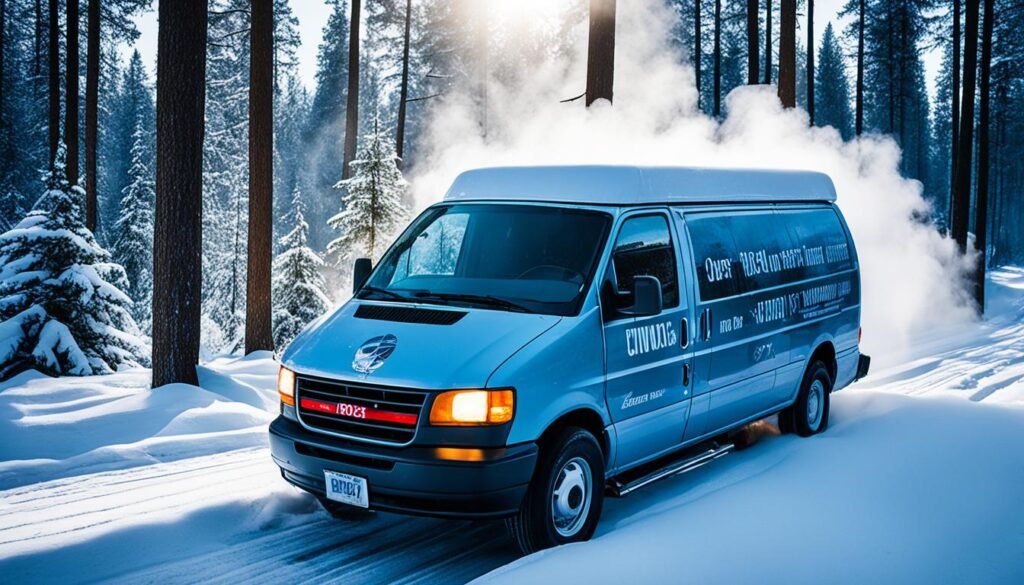
Advantages of Diesel and Gasoline Air Heaters:
- Easy to install
- Vented outside for safety
- Provide dry heat
Considerations for Diesel and Gasoline Air Heaters:
- Limited altitude ratings
- Isolated hot air output
- Less precise temperature control
Hydronic Heating Systems for Winter Van Camping
In winter, staying warm in a van is key. Hydronic heating systems are great for this. They use a coolant loop to send warmth all around. This includes hot air and even floors.
These systems give out more warmth than other types. Your van will stay warm, even in very cold weather. Plus, you get hot water on the spot for cooking and bathing.
Hydronic heaters work well even up high where the air is thin. Other heaters might not do so well up there.
These systems let you control the temperature inside your van. That way, you can make it as cozy as you like.
But, hydronic systems can be pricey. And putting them in isn’t simple. You might need a pro to help so it works right and is safe.
To visualize the benefits of hydronic heating systems, refer to the table below:
| Benefits | Considerations |
|---|---|
| More heat output | Higher cost compared to other options |
| On-demand hot water | Complex installation process |
| Higher altitude capabilities | Requires understanding of coolant loops |
| Controllable thermostat functions |
Hydronic systems are top-notch for winter camping. They give lots of heat and handy hot water. The setup can be tough and costly. But their comfort and efficiency are worth it for those who love the cold outdoors.
Propane Heaters for Winter Van Camping
Propane heaters are a great pick for heating your van in winter. If you have a propane system in your van, that’s even better. They give you a steady and efficient warmth. This keeps you cozy when it’s cold outside.
You can find two main types of propane heaters for van camping. There are emergency “off the shelf” heaters and Propex heaters. Emergency heaters are portable and easy to get from outdoor stores. They’re good for short trips but need good air flow. This is to avoid carbon monoxide buildup. They might also make your van more humid, which can cause condensation issues.
Propane heaters offer a reliable and efficient source of warmth to keep you comfortable in cold temperatures.
Propex heaters, on the other hand, are built to be a permanent heat source for your van. They burn propane cleaner than emergency heaters. They’re quiet and fuel-efficient. But, their heat might not be enough in very cold weather. So, it’s good to think about what you need from a heater and check your van’s propane system.
Benefits of Propane Heaters
There are many reasons why propane heaters are a top choice for winter van camping. Here are some benefits:
- Portability: They’re small and easy to move. This makes setting them up in your van simple.
- Fuel availability: Propane is easy to find. So, you can always top up your tank during your trips.
- Convenient control: Many models let you adjust the heat. This means you can make it as warm as you like.
- Reliability: Propane heaters work well, giving you a steady source of warmth.
- Energy efficiency: They’re designed to use fuel wisely. This gives you more heat with less fuel.
Propane heaters are great for winter van camping if set up right and safely. They make your space warm and comfy. This lets you enjoy being outdoors, even when it’s really cold. Just be sure to follow the instructions and get advice for safe use.
Note: Remember to refer to the manufacturer’s guidelines and seek professional advice when installing and operating propane heaters to ensure safety and compliance with regulations.
Altitude Considerations for Winter Van Camping
Winter van camping at high altitudes adds adventure and beauty. But, it also brings unique challenges for comfort and safety. This section will cover what you need to know and how to handle these challenges.
At high places, oxygen levels go down. This can make some heaters work poorly, especially combustion ones. To keep your van warm, use a heater rated for high altitudes. It adjusts fuel use to keep things cozy even as you go higher.
Cooking times can also change at high altitudes. With less air pressure, boiling points drop. This means water and food take longer to cook. Plan your meals with this in mind.
Insulation Gaps and Altitude
At high altitudes, insulation gaps in your van become a bigger problem. These gaps let heat out, reducing insulation effectiveness. With bigger temperature gaps, it’s important to seal these during your van build.
Altitude-Related Challenges and Tips
Here are some tips for dealing with altitude when winter van camping:
- Choose an altitude-rated heating system for consistent warmth.
- Adjust cooking times for lower boiling points at high altitudes.
- Focus on sealing insulation gaps in your van to keep warm.
- Use weatherstripping and insulation meant for high altitudes.
- Watch the weather closely and be ready for quick changes.
- Rest often and drink lots of water to avoid altitude sickness.
- Know the health risks of high altitude and talk to a doctor if necessary.
By handling these altitude issues, your winter van camping can be comfortable and memorable, even in high, stunning places.
Insulation Strategies for Winter Van Camping
Keeping your van warm and cozy during winter is key. You can do this by using smart insulation practices. These methods reduce heat loss and keep your van snug, even when it’s really cold outside.
For walls, try using mass insulators like Havelock Wool. Havelock Wool is eco-friendly and keeps your van warm and quiet. It also stops condensation and mold, which is great for camping in winter.
For the ceiling, 3M Thinsulate is a good choice. It’s light but traps air well, keeping heat in. This makes your van’s ceiling much warmer.
Don’t forget about the floor. Use rigid insulation like XPS for this. It stops the floor from getting cold and keeps the van warmer.
Also, make sure to seal any gaps. A tight, well-sealed van keeps the heat from escaping. This makes your insulation even better.
Benefits of Proper Insulation
Well-insulated vans are perfect for winter camping:
- They stay warm and comfy.
- They lose less heat and use less energy.
- They don’t get wet from condensation.
- They’re quiet and peaceful inside.
- They protect you from the extreme cold.
These insulation methods make your van a cozy home for winter adventures.
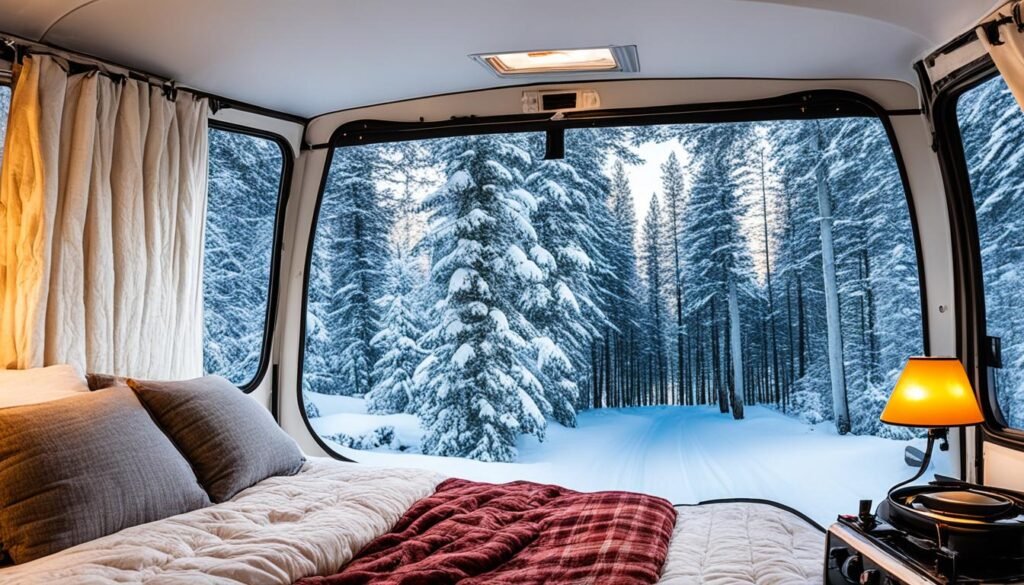
Comparison of Insulation Materials
| Insulation Material | Features | Benefits |
|---|---|---|
| Havelock Wool | 100% natural and sustainable | Excellent thermal performance and sound absorption; regulates humidity levels |
| 3M Thinsulate | Lightweight and highly efficient | Traps air and prevents heat transfer; enhances thermal performance |
| Rigid Insulation (XPS) | Provides excellent thermal resistance | Prevents cold floors; improves energy efficiency |
Sleeping Options for Winter Van Camping
Winter van camping requires the right sleeping choice for comfort. You can sleep inside your van or enjoy the thrill of a rooftop tent. Each option suits different camper’s needs.
Sleeping inside your van keeps you away from the cold. Use thick mattresses and warm sleeping bags for coziness. Down comforters also help stay warm at night.
“Sleeping inside your vehicle provides convenience and protection from the cold.”
If outdoor sleeping excites you, try a rooftop tent. They let you camp traditionally but off the cold ground. These tents fit on your van and are cozy and insulated.
Whether inside the van or in a rooftop tent, think about what you like. Both options make winter camping special.
For Traditional Tent Camping
Traditional tent camping in winter needs extra care for warmth. Use thermal camping tents for better insulation. Waterproof grounds keep moisture out.
A tent heater can make camping warmer. These heaters are safe for tents and provide steady warmth. With the right setup, winter tent camping is enjoyable.
| Sleeping Options | Benefits |
|---|---|
| Sleeping inside the van | Convenience and protection from the cold |
| Rooftop tent | Thrill of outdoor camping with elevated sleeping space |
| Traditional tent camping | Opportunity for more traditional camping experience with enhanced insulation and warmth |
Managing Moisture and Condensation in Winter Van Camping
Moisture and condensation can be tricky during winter van camping. The warm inside and cold outside make more moisture. This moisture can cause mold, mildew, and damage. But, don’t worry! You can keep your van dry and comfy with some tips.
Here are ways to handle moisture and condensation in your van.
Use Dry Heat Sources
Choose dry heat for your van like wood stoves or electric heaters. These don’t add moisture to the air. This type of heat cuts down humidity and stops condensation on windows and walls.
Allow for Airflow
It’s key to let air move in your van. Open a window or vent just a bit. This step strongly fights condensation and keeps your van dry.
Wipe Down Windows and Damp Walls
Look out for condensation on windows or damp walls. Use a towel to dry them. This stops mold and mildew before it starts.
Ensure a Clean and Dry Van
Keep your van clean and don’t let wet items like boots or clothes inside. Check for leaks or areas where water might get in. Fix them quick. A clean, dry van means fewer moisture problems.
Consider Dehumidifiers and Moisture-Absorbing Products
If it’s very humid, think about getting a dehumidifier or moisture-absorbing products. They take extra moisture out of the air. These tools can really help keep your van dry and comfy.
Using these tips can make your van a dry, cozy place for winter adventures. Keep an eye out for moisture and act fast to stop condensation. With the right care, your winter camping can be snug and free from worry.
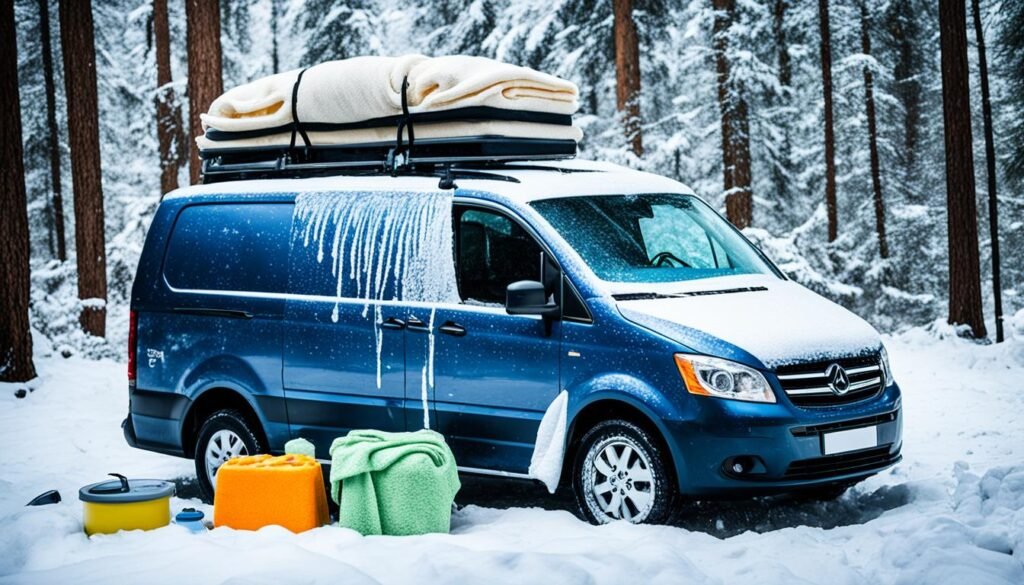
Winter Camping Gear and Equipment
Having the right gear for winter van camping is important. Being prepared with key items keeps you warm and safe. Here are essential items for your camping adventure:
1. Thermal Underwear and Clothing
Staying warm is all about layering. Get high-quality thermal wear for insulation. Merino wool and synthetics are good for their warmth.
2. Cold-Weather Sleeping Bags
A good sleeping bag is key for sleeping warm. Choose bags rated for the coldest nights. Down or synthetic bags keep heat well.
3. Thermoses with Hot Drinks
Hot drinks help you stay warm. Use a good thermos for coffee, tea, or cocoa. It’s comforting and keeps you warm outside.
4. Car Camping Heaters
Stay warm inside your van with heaters. Choose portable heaters with safety features. Use them safely with proper air flow.
5. Hot Water Bottles
Hot water bottles can warm your sleeping area. Fill a bottle with hot water for extra warmth. It’s cozy for cold nights.
For tent camping enthusiasts, check out these gear tips:
6. Four-Season Tents
Four-season tents are made for winter. They’re sturdier than other tents. They keep you warm and protect against wind and snow.
7. Waterproof Ground Barriers
Keep your tent dry with waterproof barriers. These barriers stop ground water. Choose durable and easy-to-clean options.
8. Weather-Resistant Tarps
Use tarps for extra shelter in snow or wind. They can cover your tent area. Make sure they’re well-secured against weather.
High-quality gear makes winter camping great. You can enjoy your time in the van with comfort and joy.
| Item | Description |
|---|---|
| Thermal Underwear and Clothing | Insulating and moisture-wicking materials to keep you warm |
| Cold-Weather Sleeping Bags | Provide insulation and retain heat in frigid temperatures |
| Thermoses with Hot Drinks | Keep beverages warm for a comforting boost of warmth |
| Car Camping Heaters | Portable heaters designed for outdoor use in vans |
| Hot Water Bottles | Provide localized warmth for sleeping bags or cold areas |
| Four-Season Tents | Sturdy, insulated tents designed for winter camping |
| Waterproof Ground Barriers | Prevent water seepage to keep tents dry and cozy |
| Weather-Resistant Tarps | Provide additional protection from snow and wind |
Safety Considerations for Winter Van Camping
Safety is key when going winter van camping. The cold snow and ice add risks. These require extra care on the road and at camp spots. With the right safety steps, you can have a smooth and happy camping trip.
Vehicle Safety
First, ensure your van is ready for the cold. This means having the right tires for snow and ice. You might need tire chains for extra hold in tough conditions. Also, check that your van’s brakes, battery, and other parts are working well.
Route Planning and Road Conditions
It’s important to plan your routes well to avoid danger. Always check the weather and road updates. Change your plans if needed to stay safe on your journey.
Winter Driving Safety
Driving in winter needs special skills. Learn safety tips like keeping a safe distance from other cars. Go slower and brake gently to not skid. Knowing how to deal with winter roads is key for a fun camping trip.
Emergency Supplies
Being ready for surprises is crucial in the cold. Have emergency items like warm clothes, extra food and water, and a first aid kit. Keep a roadside assistance number handy too. Being prepared means you can deal with any unexpected issues.
Safe Camping Practices
Use safe camping habits to avoid risks. Pick a campsite that drains well. Watch out for trees that could fall in bad weather. Be careful with heating devices in your van to avoid fires.
Always put safety first when you’re winter van camping. Make sure your vehicle is safe, plan your routes, know how to drive in winter, and bring emergency supplies. With these safety tips, you can fully enjoy the winter scenery on your camping trip.
Remember, these tips aren’t all you need to know. Your situation and location may have other risks. Use your best judgment and ask local experts or seasoned campers for more advice when needed.
Conclusion
Van camping in winter is exciting and lasting. Follow the tips in this guide for a warm adventure. Warmth is key with air heaters, hydronic systems, or propane heaters.
Make your van cozy and snug. Insulation and proper sleeping gear are a must.
Love the snowy views and winter joys. Stay warm with good insulation and heating. Pick the right gear and equipment. Handle moisture and be safe to enjoy more.
Get ready, take your van, and start a thrilling winter trip. See nature’s wonders, make memories, and love the season. Happy winter van camping!
FAQ
What heating options are available for winter van camping?
There are a few ways to stay warm. You can use diesel or gasoline air heaters. Hydronic heating systems and propane heaters are good too.
How do diesel and gasoline air heaters work for winter camping?
These heaters pump fuel to start a small flame. This heats air sent into your van. It keeps the space warm.
What are the advantages of hydronic heating systems for winter van camping?
Hydronic systems offer several benefits. They provide on-demand hot water and higher altitude capabilities. Plus, you can control the temperature easily.
What should I consider when choosing propane heaters for winter van camping?
Think about your van’s propane system and needs. Remember, propane heaters need good airflow. Their heat may not be as strong as others.
What considerations should I keep in mind regarding altitude when winter van camping?
Pick a heater that works well at high altitudes. Remember, cooking might take longer up high. Make sure your insulation is tight.
What insulation strategies can help keep my van warm during winter camping?
Use materials like Havelock Wool and 3M Thinsulate. Insulate your subfloor too. Don’t forget about insulated window shades and filling gaps.
What are the sleeping options for winter van camping?
You can sleep inside your van or in a rooftop tent. Make sure you have warm bedding. Think thick mattresses and warm sleeping bags.
How can I manage moisture and condensation during winter van camping?
Use a dry heat source and crack open a window. Wipe windows often. Keep your van dry. Remove wet items. Maybe use a dehumidifier.
What gear and equipment are essential for winter van camping?
You’ll need thermal clothes and cold-weather sleeping bags. Don’t forget thermoses for hot drinks. Also, consider camping heaters and hot water bottles.
How can I ensure safety during winter van camping?
Make sure you have the right tires and winter gear. Plan your travel well. Know how to drive in winter. Bring emergency supplies. Safety first!
How can I make the most of van camping in winter?
Follow these tips to stay cozy and safe. Winter van camping can be a fun experience. Enjoy the unique beauty of winter outdoors.


